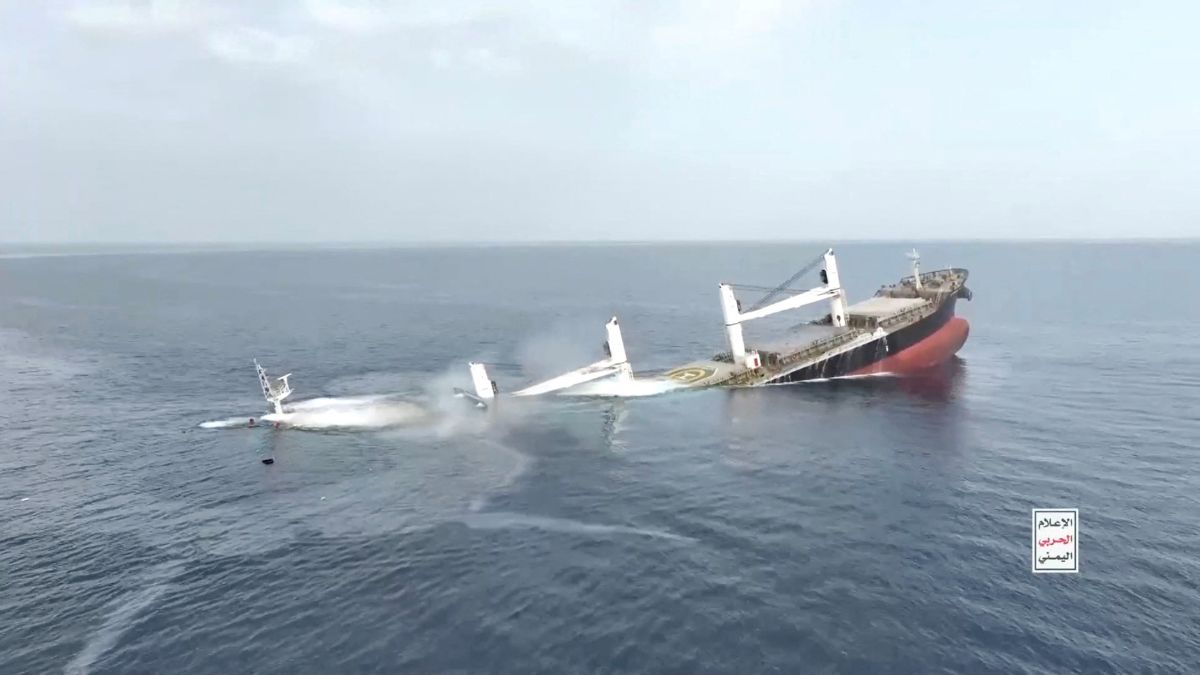‘Indian Navy is the only hope’: Analyst thinks India needs to step up to save Red Sea shipping
 A vessel said to be Greek-operated, Liberia-flagged Eternity C sinks in a footage released by Yemen's Houthis, in the Red Sea | Reuters
A vessel said to be Greek-operated, Liberia-flagged Eternity C sinks in a footage released by Yemen's Houthis, in the Red Sea | Reuters
The Yemeni militant group Houthis swung back to action after a lull early this month, sinking two bulk carriers in the Red Sea, proving that the efforts of the West to rein in the Iranian proxy group to protect Red Sea shipping lanes have failed. The European Union's counter-Houthi mission ‘Operation Aspides’ struggles with the inadequate warships it needs to fully protect the European and Israeli vessels, while the US vessels are spared after the Trump administration reached a ceasefire with the rebels in May.
While the Houthis' firepower and tactics have rendered European naval power useless, an analyst thinks there is only one power that can protect the sea lanes from the Houthis: the Indian Navy.
According to Elizabeth Brough, a senior fellow at the think tank Atlantic Council, the Houthi attacks on vessels should be of particular concern to India, which is the third-largest supplier of seafarers in the world, after the Philippines and Russia. Especially since one of the crew members who died when Houthis sank Liberian-flagged ‘Eternity C’ was an Indian. The ship was hit by an anti-tank missile while sailing off the coast of Al-Hudaydah.
Following the incident, the Philippine government issued an order banning seafarers from working in the Southern Red Sea & Gulf of Aden. A total of 38 Filipino seafarers were caught in these attacks. While many were rescued, several remain missing, and at least three are possibly dead.
While India has not yet followed the Philippines’ lead and banned ships with Indian crews from entering the Red Sea, it can do something else: step up in preventing the attack.
Brough argues, in a piece that appeared in Foreign Policy, that “India has a large navy, which recently impressed the international community when it bravely rescued sailors captured by Somali pirates”.
India is also a rising political power and could play a key role in restoring traffic on the Red Sea. With a fleet of about 130 ships, India could choose to act with military resolve. It could join Operation Aspides and send its own ships to the region. “The European operation, which recently proposed expanding cooperation with the Indian Navy in the fight against piracy, would surely welcome such an initiative,” the analyst added.
Brough said India's participation in the operations would nullify the Houthis' claims of targeting only the West. “If the Indian Navy begins escorting ships through the Red Sea on a regular basis – and protecting them from Houthi attacks – it will be even harder for the Houthis to claim they are fighting the West. Given the fact that the Indian Navy is already operating in a relatively nearby area, off the coast of Somalia, its deployment in the Red Sea would be a natural move,” she said.
The analyst says India would not even need to form a formal alliance with the European Union or any other geopolitical body. “At the height of the piracy crisis in the late 2000s, countries from Britain to China cooperated to protect shipping off the coast of Somalia, even without a joint command or binding political alliance. It is a model that could work now,” she claims, adding that Operation in the Red Sea could be an opportunity for India to demonstrate the power of its deep-sea fleet and its ability to deal with burning international issues.
“In this case,New Delhi could lead the way in dealing with a crisis that even the world's most powerful power has not yet been able to contain,” she argues.
Brough states that though an Indian naval escort alone may not make the entire Red Sea a safe zone, it can certainly make the Gulf of Aden safe enough so that sailors no longer fear for their lives every time they cross.
Middle East